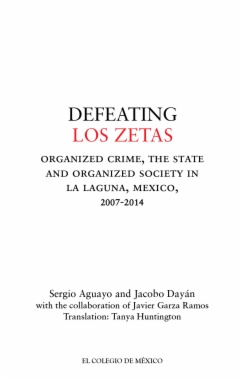The narrative regarding criminal violence in Mexico tends to highlight the negative, while minimizing success stories: this book is different. It explains the reasons why the region of La Laguna succeeded in reducing the statistics of homicides and missing persons and how it started to attend to the families of victims. There were two key factors: 1)federal, state, and local government pushing aside party differences in order to coordinate efforts, and 2) dialogue and response to the petitions of social actors. The result is the best security model in Mexico.
- Cover
- Staff
- Table of Contents
- Editorial
- Splitting Selves: Crip Time and the Temporalities of Disability in Georgia Webber’s Dumb: Living Without a Voice
- The Temporalities of Disability
- “Who am I without it?”: Georgia and Her Split Selves
- “The slower you go, the more you’ll feel”: Creativity and Crip Time
- Works Cited
- Towards Horizontal Relationships: Anarcha Indigenism, Decolonial Animal Ethic, and Indigenous Veganism
- Introduction
- Anarcha-Indigenism: An Emerging Framework
- Decolonial Animal Ethic
- Indigenous Veganism
- Global Solidarity Network
- Artivism
- Anarcha-Indigenism: Challenges
- Conclusion
- Works Cited
- “Catherine Tekakwitha, who are you?” — The Indigenous Female Body in the Colonial and Post-Colonial Imagination of Leonard Cohen’s Beautiful Losers
- Introduction
- The Colonial Gaze of the Indigenous Woman
- “Naturellement chrétienne”—The Savage Saint
- “Like a well-raised French girl!”—The History of Tekakwitha
- Catherine Tekakwitha as Muse
- “Do I have any right?” – Sexualizing the Indigenous Woman
- Conclusion
- Works Cited
- Inuit Sentinels: Examining the Efficacy of (Life) Writing Climate Change in Sheila Watt-Cloutier’s The Right to Be Cold
- Ways of Being on the Land: A Life Story of Transformations in the Canadian Arctic
- Confronting the Climate Crisis: A Global Call to Action
- Affect as an Autobiographical Approach
- Conclusion
- Works Cited
- The Plants are Plotting: Political Orders in Ostenso’s Wild Geese
- Plant Politics
- Crop Cultivators
- Following Flax
- Beyond the farm, beyond patriarchy
- Complicity is complexity
- Flax’s final act
- Works Cited
- Beautiful the beauty—Dionne Brand’s Theory and Canisia Lubrin’s Voodoo Hypothesis
- i. Thesis x: Beauty is not the absence of ugliness in the physical terrain of Canisia Lubrin’s poetry collection Voodoo Hypothesis
- ii. Theory x: All the beautiful pages written on the human bodies of Dionne Brand’s novel Theory
- Concluding remarks
- Works Cited
- It’s All About the Body: Zombification and the Male Gaze in Oryx and Crake and Brown Girl in the Ring
- Neo-Cosmopolitan Tidalectics as Planetary Poetics in Kaie Kellough’s Magnetic Equator
- Emergent Critical Strategies Against the Nation-Trap: The Digitization of Literary Apocalyptic Affects and Larissa Lai’s The Tiger Flu
- Reflecting on the Influence of National Structures; Digitizing Literary Apocalypse
- Sieve Reading The Tiger Flu: The Post-Apocalyptic Nation
- Conclusion
- Works Cited
- “Civilizing” the “Barbaric” Child: The Case of the Khadrs
- Methodology
- Omar Khadr
- Khadr Family Background
- Maha Elsamnah: Framing the “Mother of Terror”
- The Metaphorical Adoption
- Conclusion
- Works Cited
- Contributors
- Back cover

